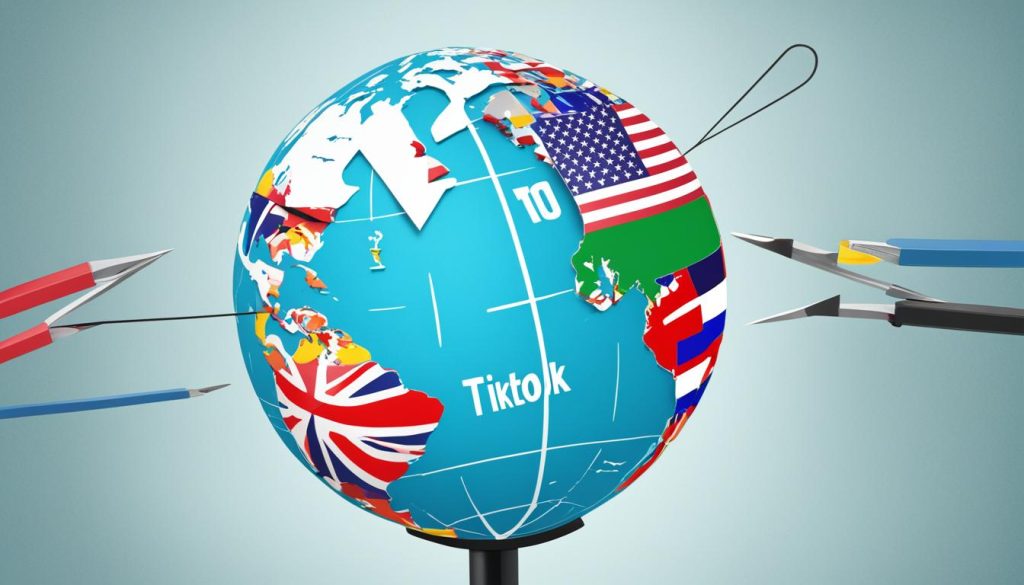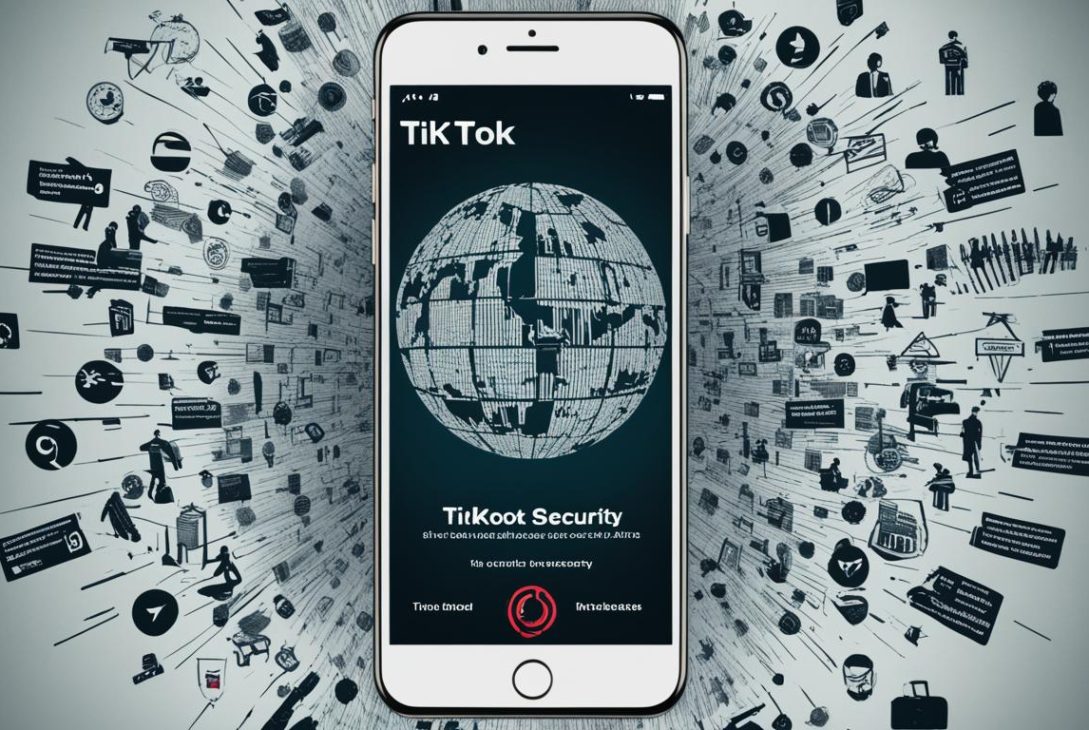The U.S government is considering a ban on TikTok, the popular short-form video app with millions of users in America. This move comes amidst concerns over national security and data privacy, as TikTok is owned by a Chinese-based company. The potential ban has sparked debates among lawmakers, tech industry experts, and users, all eager to understand the implications and consequences.
The possibility of a TikTok ban in the U.S has been a topic of discussion since former President Donald Trump’s opposition to the app. However, the debate continues, with lawmakers voicing their opinions on both sides of the argument.
Some members of Congress, such as GOP Reps. Nancy Mace and Marjorie Taylor Greene, have voted against the TikTok ban bill, stating that their decision is not influenced by Trump’s opposition. They believe that the bill does not effectively protect Americans’ data or national security from China. Rep. Mace, citing her libertarian beliefs, has been vocal about the lack of constitutional grounds for banning apps, expressing her opposition from the beginning. Concerns were also raised about the potential buyer of TikTok, further complicating the issue.
On the other hand, Rep. Don Bacon defended the bill, emphasizing its purpose to force TikTok’s Chinese-based parent company to divest the app. He argues that the potential ban is necessary to safeguard national security and protect American user data.
Key Takeaways:
- The U.S government is considering a ban on TikTok due to concerns over national security and data privacy.
- Lawmakers have varying opinions on the ban, with some questioning its effectiveness in protecting American interests.
- The potential buyer of TikTok and constitutional grounds for banning apps have emerged as key factors in the debate.
- Rep. Don Bacon supports the ban, highlighting the need to protect national security and American user data.
- This issue continues to evolve, with ongoing discussions being held at the legislative level.
U.S Government’s Concerns Over TikTok Security
The U.S government has raised significant concerns regarding the security of TikTok, primarily due to its ownership by a Chinese company. These concerns stem from potential data privacy breaches and the risk of Chinese access to user information, resulting in national security risks.
Multiple U.S intelligence agencies have initiated investigations into TikTok to assess its alleged ties to the Chinese government and to evaluate the extent of the potential threats it poses. The U.S government aims to ensure effective user data protection and safeguard against unauthorized Chinese access to user information.
“The U.S government’s concerns revolve around the need to protect sensitive user data and prevent potential threats to national security posed by foreign access to such data.” – U.S intelligence agency spokesperson
The investigation into TikTok’s security and data privacy has prompted the U.S government to consider taking measures to address these concerns. Potential actions may involve increased scrutiny of TikTok’s data handling practices, stricter regulatory oversight, or even restrictions on the use of TikTok within U.S government agencies.
| Concerns | Implications |
|---|---|
| Data Privacy Breaches | Potential compromise of user information |
| Chinese Access to User Information | Risk of unauthorized access to sensitive data |
| National Security Risks | Potential threats to U.S national security |
User Data Protection Measures
- Enhanced data security protocols and encryption
- Strict regulations on data sharing with foreign entities
- Regular security audits and assessments
The U.S government’s concerns surrounding TikTok’s security have highlighted the need for increased vigilance in protecting user data and mitigating potential national security risks. This ongoing scrutiny reflects the evolving landscape of data privacy and the challenges posed by global technology platforms.
Potential Economic Impact of a TikTok Ban
A ban on TikTok in the U.S could have far-reaching economic consequences, impacting various sectors and causing significant disruptions. Let’s explore the potential ramifications of a TikTok ban from an economic perspective.
Tech Industry Consequences
The tech industry, which includes app developers, advertisers, and influencers, heavily relies on TikTok as a popular platform for reaching and engaging with a wide audience. A ban on TikTok would disrupt the industry’s ecosystem and could lead to a decline in revenue for companies that depend on the app for growth.
The loss of TikTok as a platform for content creation and distribution would also impact the innovative landscape of the tech industry. Developers may have to reassess their strategies and investments, leading to a shift in focus and potential setbacks in technological advancements.
Job Loss
With TikTok’s ban, numerous jobs tied to the app could be at risk. Content creators, marketers, and influencers who rely on TikTok for their livelihoods may experience significant job losses and financial instability.
Additionally, the closure of TikTok’s U.S operations would directly impact the app’s employees, ranging from engineers and designers to customer support and operations personnel. The sudden loss of jobs could have ripple effects on the overall workforce, exacerbating unemployment rates and straining local economies.
App Store Revenue Loss
TikTok’s ban would mean a substantial loss of revenue for the app stores that distribute it. The platform’s popularity has contributed to a significant number of downloads and in-app purchases, translating into a considerable source of income for Apple’s App Store and the Google Play Store.
App stores generate revenue through commissions on in-app purchases and advertising fees. A TikTok ban would result in a decline in app store earnings, potentially impacting their ability to invest in future app development and innovation.
Social Media Market Disruption
TikTok’s ban would undoubtedly disrupt the social media market, especially in terms of user engagement and the way social media platforms evolve. TikTok has revolutionized the short-form video format, setting new trends and challenging established platforms.
Alternative social media platforms may emerge, attempting to fill the gap left by TikTok’s absence. Users might migrate to these platforms, leading to a fragmenting and reshaping of the social media landscape. This shift would require platforms to adapt their strategies to attract and retain the TikTok user base, leading to increased competition and innovation in the industry.
International Ramifications of a TikTok Ban
A TikTok ban in the U.S could have far-reaching implications on an international scale. As the global tech industry has become increasingly connected, any action taken against a major player like TikTok will undoubtedly have ripple effects throughout the entire ecosystem.
One of the key considerations is the response of foreign governments to the ban. If the U.S chooses to ban TikTok, it’s likely that other countries will pay attention and evaluate their own stance on the popular social media platform. This could lead to a domino effect of app bans and restrictions, as governments strive to protect their own national interests and security.
Global Tech Industry Effects
The global tech industry may also experience significant effects as a result of a TikTok ban. With its massive user base and influence, TikTok has become a major player in the social media landscape. Its absence in a key market like the U.S would shake up the industry, triggering a need for adjustment and innovation.
Companies that rely heavily on TikTok for marketing and advertising may have to reevaluate their strategies and find alternative platforms to reach their target audience. It could also result in a shift in power dynamics within the tech industry, as new players emerge and seek to fill the void left by TikTok.
Foreign Government Response and Reciprocity in App Bans
Foreign governments are likely to closely watch and respond to the U.S government’s actions regarding a TikTok ban. Some countries may take a similar approach and implement their own restrictions on U.S-based social media platforms. This reciprocity in app bans could further escalate tensions and impact the global digital landscape.
“A TikTok ban in the U.S may trigger a tit-for-tat response from other nations, resulting in a fragmented app landscape and potential limitations on cross-border digital interactions.” – Tech Analyst
With the interconnectedness of the digital world, the consequences of app bans extend beyond national borders. It becomes a matter of international relations and cooperation, as countries navigate the balance between national security concerns and the preservation of an open digital environment.

User Reactions and Alternatives to TikTok
As news of a potential TikTok ban in the U.S spreads, users are expressing a range of reactions to the uncertain future of the popular social media platform. Many TikTok users have become highly engaged and involved in the app’s content, fostering a sense of community among creators and viewers alike. The possibility of losing access to TikTok has left users concerned about the impact on their ability to connect, create, and share content.
Should the TikTok ban be implemented, users may seek out alternatives to satisfy their social media cravings. The search for a new platform could lead to a significant migration of users to competing apps that offer similar features and content formats. Existing social media platforms that cater to short-form video content, such as Instagram Reels and YouTube Shorts, may experience a surge in user adoption as TikTok users explore alternative options.
In the wake of user privacy concerns surrounding TikTok’s Chinese ownership, individuals may also view the potential ban as an opportunity to prioritize their data security and privacy. Many users worry about the safety of their personal information and the potential risks associated with a foreign entity having access to their data. Exploring alternative platforms that prioritize user privacy may become a priority for those who are particularly vigilant about protecting their online presence.
TikTok’s potential ban has left users uncertain about the app’s future, leading them to consider alternative social media platforms. Whether it’s a desire to maintain their creative outlet, connect with others, or safeguard their privacy, users are actively seeking options beyond TikTok.
Alternative TikTok-like Platforms
For users looking for platforms that offer a similar experience to TikTok, there are several alternatives worth exploring:
- Instagram Reels: Instagram’s response to TikTok, Reels allows users to create and share short videos set to music. With its existing user base and integration with the Instagram ecosystem, Reels provides a familiar and accessible alternative for TikTok users.
- YouTube Shorts: YouTube’s answer to short-form video content, Shorts provides a platform for creators to showcase their talent and engage with a wide audience. As part of one of the largest video-sharing platforms globally, Shorts offers significant reach and potential opportunities for content creators.
- Triller: Triller has gained popularity as a TikTok alternative, offering a similar content creation and sharing experience. With its unique emphasis on music, Triller appeals to users who enjoy adding soundtracks to their videos.
While these alternatives can provide a temporary solution for TikTok users, the sense of community and distinct content offerings found on TikTok may be challenging to replicate on other platforms.
Legal and Constitutional Considerations of a TikTok Ban
Implementing a TikTok ban raises important legal and constitutional considerations. The potential implications of such a ban have sparked debates over key constitutional rights and concerns about freedom of speech.
Some argue that banning the app could implicate First Amendment rights, which protect the freedom of speech, expression, and association. TikTok, as a platform for creative content, has become a significant medium for users to exercise these constitutional rights. Its ban would raise questions about the extent to which the government can limit speech and expression on digital platforms.
The First Amendment concerns in relation to a TikTok ban center around the potential infringement of users’ rights to express themselves and access a broad range of ideas and opinions. Critics argue that by banning TikTok, the government would be limiting individuals’ abilities to engage in public discourse, stifling creativity, and potentially establishing a dangerous precedent for restricting online speech.
Moreover, implementing a TikTok ban may also face judicial challenges. The legality and constitutionality of such a ban would likely be subject to rigorous scrutiny in the court system. Legal experts and civil liberties organizations would undoubtedly file lawsuits, arguing that the ban infringes upon individuals’ constitutional rights.
Judicial challenges would further delve into the legal implications of a TikTok ban and the balance between national security concerns and preserving constitutional rights. Courts would examine the evidence presented by the government to demonstrate the necessity and proportionality of the ban, ensuring that it does not overreach or unreasonably restrict users’ rights.
“A TikTok ban may implicate First Amendment rights, raising concerns about freedom of speech.”
As the debate on whether to ban TikTok continues, it remains to be seen how the legal and constitutional considerations surrounding the app will unfold. The government must carefully weigh the potential national security risks against the potential infringement of users’ constitutional rights, ultimately aiming to strike a balance between the two.
The Tech Industry Response to TikTok Ban
The potential ban on TikTok has sparked significant response and action from the tech industry. Companies are actively engaging in lobbying efforts to influence regulations and policies surrounding the ban. They are advocating for a more nuanced approach, emphasizing the importance of safeguarding user data and national security without imposing a complete ban.
“We believe that a comprehensive regulatory framework is necessary to address the concerns raised by TikTok’s Chinese ownership. A ban would have far-reaching consequences, impacting not only TikTok but also the broader tech industry and the millions of users who rely on these platforms for entertainment and connection.”
– Tech Industry Representative
In addition to lobbying, companies are prioritizing regulatory compliance to mitigate the risk of similar bans affecting their platforms. They are strengthening data protection measures and enhancing security protocols to ensure that user data remains secure.
The implications of a TikTok ban extend beyond the immediate impact on the app itself. Developers in the tech industry are now more cautious and mindful of the political and security risks associated with their platforms. They are considering these factors during app development, aiming to strike a balance between innovation and enhanced security measures.
Industry Lobbying Efforts
The tech industry is leveraging its influence and resources to advocate for alternatives to a complete TikTok ban. Major tech companies, industry associations, and trade organizations are actively lobbying lawmakers and regulators to explore more targeted and proportionate measures. Their efforts focus on implementing robust data privacy and security requirements while allowing users to continue accessing the app within reasonable bounds.
Regulatory Compliance and Risk Mitigation
Companies are taking proactive steps to ensure regulatory compliance and mitigate the risk of facing a similar ban in the future. They understand the need to address concerns surrounding user data and national security. By adhering to stricter data privacy regulations and implementing comprehensive security measures, tech companies aim to demonstrate their commitment to safeguarding user privacy and protecting national interests.
Implications for Future App Development
The potential ban on TikTok has highlighted the importance of considering political and security risks during app development. Developers are now more focused on creating platforms that prioritize user privacy and adhere to robust security standards. This shift in mindset will likely influence the direction of future app development, with increased emphasis on striking a balance between innovation and ensuring the protection of user data.
| Lobbying Efforts | Regulatory Compliance | Future App Development |
|---|---|---|
| Engaging lawmakers and regulators to explore targeted measures | Adhering to stricter data privacy regulations and implementing comprehensive security measures | Creating platforms that prioritize user privacy and adhere to robust security standards |
| Advocating for comprehensive regulatory frameworks | Demonstrating commitment to safeguarding user privacy and protecting national interests | Striking a balance between innovation and ensuring data protection |
| Seeking alternatives to a complete ban | Mitigating the risk of facing similar bans | Considering political and security risks in app development |
Repercussions on China-U.S Tech Relations
A TikTok ban has the potential to exacerbate tech trade tensions between China and the United States. While the ban may seem concentrated on a single app, its implications extend far beyond. The ban raises significant questions about technology transfer, geopolitical implications, and global competition in the tech industry.
The current tech trade tensions between China and the U.S. have been a topic of concern and debate. The competition for dominance in emerging technologies like artificial intelligence, 5G, and cybersecurity has intensified. Both countries have been vying for leadership in these areas, resulting in strained relations and an increasing sense of rivalry.
The ban on TikTok adds another layer to this already complex dynamic. It further highlights the challenges related to technology transfer and the control of valuable data. With TikTok’s significant user base and access to user information, the ban raises issues around data ownership, privacy, and national security.
Moreover, the ban has geopolitical implications. It showcases the power of technology in shaping global narratives and the role of social media platforms in influencing public opinion. The ability to control and restrict access to popular apps like TikTok can impact information flows and shape public discourse.
The ban also underscores the global competition for dominance in the tech industry. China and the U.S. are at the forefront of this competition, with each nation striving to lead in innovation, entrepreneurship, and disruptive technologies. Actions like the TikTok ban can be seen as strategic moves to gain a competitive edge and protect national interests.
Overall, the implications of a TikTok ban go beyond the app itself. They touch upon broader issues in China-U.S tech relations, including trade tensions, technology transfer, geopolitical considerations, and global competition. The outcome of this ban will have lasting effects on the relationship between the two countries and shape the future landscape of the tech industry.
Future of TikTok and the Social Media Landscape
The potential ban on TikTok has left many wondering about the app’s future and its role in the ever-evolving social media landscape. With millions of active users worldwide, TikTok has become a dominant player in the short-form video app market, capturing the attention of users and content creators alike.
However, the ban on TikTok also shed light on the increasing relevance of short-form video apps in the tech industry. As attention spans shorten and the demand for bite-sized content grows, these apps provide a unique platform for creativity and entertainment. This has prompted tech industry leaders to explore innovative ways to enhance user engagement and drive innovation in this space.
The outcome of the ban will not only determine TikTok’s fate but also shape the future direction of the social media landscape. As users and content creators seek alternatives, other short-form video apps are likely to gain momentum and attract a significant user base. This could potentially lead to a shift in the dynamics of the social media market, with new players emerging as strong contenders in the industry.
Moreover, the potential ban on TikTok presents an opportunity for the tech industry to innovate further in this domain. Developers and entrepreneurs may explore new avenues to meet the growing demand for short-form video content while ensuring user privacy and security. This could fuel the development of cutting-edge technologies and pave the way for transformative advancements in the social media landscape.
FAQ
What are the possible economic consequences of a TikTok ban in the U.S?
The tech industry may face disruptions, and job losses could occur. Furthermore, app stores may experience a loss of revenue, and there could be significant changes in the social media market.
How might a TikTok ban in the U.S affect foreign governments and the global tech industry?
There could be international ramifications, with foreign governments responding to the ban. Additionally, the global tech industry may experience effects, and there may be discussions around reciprocity in app bans.
What are the user reactions to the potential TikTok ban, and what alternatives might they explore?
Users have expressed concerns about the future of the app. If TikTok becomes unavailable in the U.S, many may explore alternative social media platforms to fulfill their short-form video needs.
What legal and constitutional considerations arise from implementing a TikTok ban?
Some argue that the ban may implicate First Amendment rights, raising concerns about freedom of speech. The issue may face legal challenges, as the ban delves into the broader legal implications of app bans.
How might the tech industry respond to a TikTok ban?
The tech industry may engage in lobbying efforts to influence regulations. Companies may also prioritize regulatory compliance to avoid future bans. The ban could change the way developers approach app development in terms of politics and security.
What are the potential repercussions on China-U.S tech relations if TikTok gets banned?
A TikTok ban may intensify tech trade tensions between China and the U.S. The ban raises questions about technology transfer, geopolitical implications, and global competition, impacting the broader China-U.S tech relations.
What does the potential TikTok ban mean for the future of the app and the social media landscape?
The ban calls into question the app’s future and its position in the social media landscape. It also highlights the significance of short-form video apps and potential innovation in the tech industry’s approach to this space.
and users as TikTok is owned by a Chinese-based company. The potential ban has sparked debates among lawmakers tech industry experts the popular short-form video app with millions of users in America. This move comes amidst concerns over national security and data privacy The U.S government is considering a ban on TikTok u.s could ban tiktok: potential impact
Last modified: March 13, 2024





